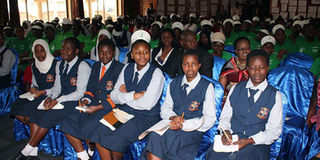Our future is in emancipated girls

Students participate in an event at the Kenya Institute of Curriculum Development in Nairobi during the International Day of the Girl Child on October 11, 2016. Girls have been posting excellent results in national examinations in recent times. PHOTO | FILE | NATION MEDIA GROUP
What you need to know:
- The future of the girl child must never be predicated on a roll of the dice to establish her course.
- We have an obligation to work in concert with one another to ensure our girls have a chance to be the best that they can be.
"GirlForce: Unscripted and Unstoppable" is the theme of today’s International Day of the Girl Child celebrations.
Let us indulge, in retrospect, the journey we have travelled; the milestones we have achieved, and the challenges we have faced, with the Beijing Declaration and Platform for Action of 1995 as the guiding principle.
Appreciably, the girl child has become bolder and more daring, more vocal in advocating her rights, and taken the lead in drawing our attention to issues of national and global concern.
Today’s girl is not intimidated by the complexity of a challenge or the inadequacies in her environment. She is unbowed and unrelenting, ready to step up when others scamper, stand up when others shudder and speak up even when others hush.
Such boldness was on display at the United Nations Climate Action Summit in New York last month, when 16-year-old Swedish girl Greta Thunberg left world leaders in awe with her speech on apparent inaction on climate change.
ACTIVISM
In the United States, Emma Gonzalez, 19, has taken up a pivotal role as an advocate of gun control after surviving a shooting at school in Florida last year.
In Kenya, Yvette Hupje, 14, staged a solo protest outside Parliament in May to draw the attention of MPs to her campaign against single-use plastic bottles.
And at this year’s UN Environment Assembly in Nairobi, Charlotte Wanja, 17, gave a riveting speech on pollution and global warming.
Our girls have been posting excellent results in national examinations in recent times, signalling a major shift in the country’s scholastic orientation.
The top pupil in the 2017 Kenya Certificate of Primary Education (KCPE) exam was a girl, Goldalyn Kakuya. That was replicated the following year, when Olive Mwea was the joint-best pupil (with Rawlings Odhiambo).
PERFORMANCE
The top Kenya Certificate of Secondary Education (KCSE) candidates in 2017 and 2018 were girls — Naomi Karimi and Juliet Otieno, respectively.
Such outcomes are transitioning into pursuance of careers hitherto a preserve for men, venturing into male-dominated careers and competition for top corporate and political positions by the girls.
But despite the shattered glass ceilings, global advocacy and other mind-boggling feats, our girls still grapple with an avalanche of challenges every day — such as sexual exploitation, abuse and harassment.
The severity of this issue made it a top agenda in a roundtable on the sidelines of the UNGA convened by the Organisation for Economic Cooperation and Development (OECD) and the Swedish International Development Cooperation Agency (Sida).
SEXUAL HARASSMENT
In this session, part of an extensive discussion on efforts made in the realisation of specifics under the Sustainable Development Goals (SDGs), I articulated the issue in the Kenyan and African contexts.
Resolutions included implementation of recommendations on Development Assistance Committee (DAC) by member countries and organisations and enforcement of laws to emancipate girls from societal prejudices that hamper them from realising their full potential.
The government has made frantic efforts to address sexual exploitation, abuse and harassment by enacting broad-ranging laws, policies and regulations. These include the Sexual Offences Act, Employment Act, Education and Training Sector Gender Policy and the National Policy on Prevention and Response to Gender-Based Violence.
A toll-free hotline at the Gender ministry and a special unit at the Office of the Director of Public Prosecution to handle female genital mutilation (FGM) and other gender-based violence (GBV) cases have been established. But more needs to be done.
SUPPORT
Our sincerity in ending GBV, in its multiplex form and shape, will be measured not by what we say but do to protect to our girls from physical, sexual and emotional abuse.
It is important that leaders, government officials, corporate executives, heads of learning institutions and other persons in authority create confidential channels and enforce laws that will curb GBV and support gender equality and women empowerment programmes.
In the words of Indian economist Bhimrao Ramji, “the progress of a community is measured by the degree of progress which women have achieved”.
The future of the girl child must never be predicated on a roll of the dice to establish her course.
We have an obligation to work in concert with one another, transcend our gender biases and speak in one accord to ensure our girls have equal opportunities as our boys and a chance to be the best that they can be in life.
By protecting and empowering our girls from a tender age, and even after they become women, we will be raising an unstoppable generation that will stand strong for us all, uphold national values and make Kenya a better, safer and stronger country.
GirlForce: Unscripted and Unstoppable!
Ms Waiguru is Governor, Kirinyaga County. @AnneWaiguru





